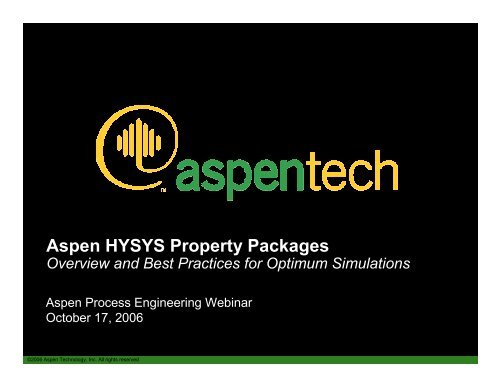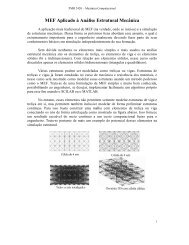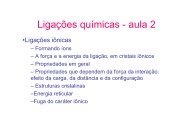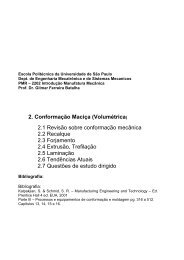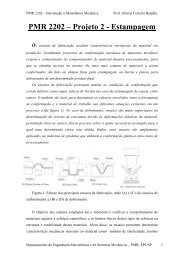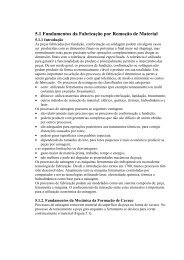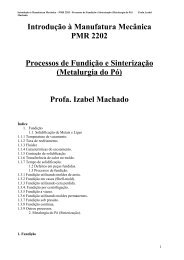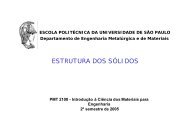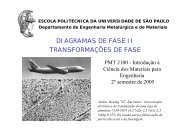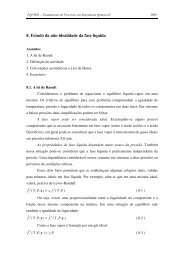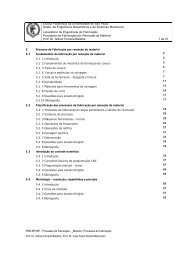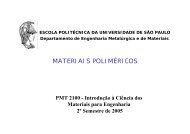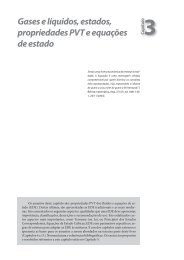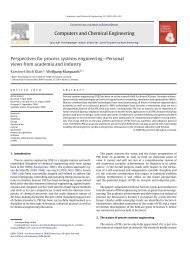Aspen HYSYS Property Packages
Aspen HYSYS Property Packages
Aspen HYSYS Property Packages
You also want an ePaper? Increase the reach of your titles
YUMPU automatically turns print PDFs into web optimized ePapers that Google loves.
<strong>Aspen</strong> <strong>HYSYS</strong> <strong>Property</strong> <strong>Packages</strong><br />
Overview and Best Practices for Optimum Simulations<br />
<strong>Aspen</strong> Process Engineering Webinar<br />
October 17, 2006<br />
©2006 <strong>Aspen</strong> Technology, Inc. All rights reserved
<strong>Aspen</strong> <strong>HYSYS</strong> <strong>Property</strong> <strong>Packages</strong><br />
• Maria Jesus Guerra, PhD<br />
– Director, Business Consulting (Engineering)<br />
<strong>Aspen</strong>Tech, Barcelona (Spain)<br />
– Email: maria.guerra@aspentech.com<br />
• With support from:<br />
– Laurie Wang and Wim van Wassenhove<br />
©2006 <strong>Aspen</strong> Technology, Inc. All rights reserved<br />
2
Agenda<br />
• Introduction<br />
• Review of methods available in <strong>Aspen</strong> <strong>HYSYS</strong><br />
• Thermodynamics assistant in <strong>HYSYS</strong> 2006<br />
• Recommendations and tips for applications in:<br />
– Oil & Gas<br />
– Refining<br />
• Demonstration (as we go)<br />
• Q & A<br />
©2006 <strong>Aspen</strong> Technology, Inc. All rights reserved<br />
3
What is Process Simulation?<br />
©2006 <strong>Aspen</strong> Technology, Inc. All rights reserved<br />
4
How Does <strong>Aspen</strong> <strong>HYSYS</strong> Work?<br />
©2006 <strong>Aspen</strong> Technology, Inc. All rights reserved<br />
Thermodynamic models are used to represent<br />
the phase equilibrium behavior and energy level<br />
of pure compound and mixture systems.<br />
Fluid Package Rxn Manager Main Flowsheet<br />
Thermo Model Define Rxns<br />
Component Sub-flowsheet<br />
Oil Manager Hypothetical Column<br />
Define Oil Manager<br />
Basis Environment Simulation Environment<br />
5
Can We Believe Simulation Results?<br />
©2006 <strong>Aspen</strong> Technology, Inc. All rights reserved<br />
In many cases, simulation results DO NOT reflect<br />
what is really happening in a plant<br />
WHY?<br />
• Improperly selected thermodynamic models<br />
• Inadequate model parameters<br />
• Incorrect hypothetical components generation<br />
• Problems with plant data consistency<br />
6
Different Models - Different Phase Behavior<br />
Example:<br />
• A mixture of Ethane and Propane at 30 atm<br />
• The PR Equation of State most closely represents the true phase behavior of the system<br />
• Peng Robinson EOS<br />
• Dew point 50.1 C<br />
©2006 <strong>Aspen</strong> Technology, Inc. All rights reserved<br />
• Vapor Pressure model<br />
• Dew point 54.3 C<br />
• Good predictions at<br />
low pressures<br />
• NRTL Ideal<br />
7
Thermodynamic Models in <strong>Aspen</strong> <strong>HYSYS</strong><br />
<strong>Aspen</strong> <strong>HYSYS</strong> contains over 30 thermodynamic models<br />
• Equations of State<br />
• Activity Coefficient Models<br />
• Vapor Pressure Models<br />
• Semi-Empirical Models<br />
• Specialty Models<br />
– Steam Tables<br />
– Amines Package<br />
– Clean Fuels Package<br />
– Glycol Package<br />
– OLI<br />
– Neotec Black Oil<br />
– Infochem Multiflash<br />
– etc.<br />
©2006 <strong>Aspen</strong> Technology, Inc. All rights reserved<br />
8
Equation of State (1)<br />
• Peng-Robinson (PR)<br />
– Most enhanced model in <strong>Aspen</strong> <strong>HYSYS</strong><br />
– Largest applicability range in terms of T and P<br />
– Special treatments for some key components<br />
– Largest binary interaction parameter database<br />
• PRSV<br />
– Modified PR model<br />
– Better representation of vapor pressure of pure components<br />
and mixtures<br />
– Extends applicability of the original PR model to moderately<br />
non-ideal systems<br />
• SRK<br />
– Modified RK model<br />
– Can provide comparable results to PR in many cases, but<br />
with a lot less enhancement in <strong>Aspen</strong> <strong>HYSYS</strong><br />
©2006 <strong>Aspen</strong> Technology, Inc. All rights reserved<br />
9
Equation of State (2)<br />
• PR-Twu<br />
• SRK-Twu<br />
• Twu-Sim-Tassone (TST)<br />
– Modified equations of state models for hydrocarbon systems-non<br />
ideal systems (used for glycol package)<br />
• Generalized Cubic Equation of State (GCEOS)<br />
– Provides a framework which allows users to define and implement<br />
their own generalized cubic equation of state including mixing rules<br />
and volume translation<br />
©2006 <strong>Aspen</strong> Technology, Inc. All rights reserved<br />
10
Equation of State (3)<br />
• MBWR<br />
– Modified BWR model<br />
– Having 32 parameters, this model works extremely well with a number of<br />
pure components within specified T and P ranges<br />
• Lee-Kesler-Plöcker<br />
– Also a modified BWR model<br />
– Can be used for non-polar substances and mixtures<br />
• BWRS<br />
– Modified BWR to handle multi components<br />
– Requires experimental data<br />
• Zudkevitch Joffee<br />
– Modified RK model with better prediction of VLE for hydrocarbon systems,<br />
and systems containing hydrogen<br />
• Kabadi-Danner<br />
– Modified SRK model with the enhancement to improve the VLE calculations<br />
for H2O-hydrocarbon systems, particularly in dilute regions<br />
• Sour PR/Sour SRK<br />
– Used for sour water systems containing H2S, CO2, and NH3 at low to<br />
moderate pressures<br />
©2006 <strong>Aspen</strong> Technology, Inc. All rights reserved<br />
11
Vapor Pressure Models<br />
• Modified Antoine Model<br />
– Applicable for low pressure systems that behave ideally<br />
• Braun K10 Model<br />
– Strictly applicable to heavy hydrocarbon systems at low pressures<br />
• Esso K Model<br />
– Also strictly applicable to heavy hydrocarbon systems at low pressures<br />
©2006 <strong>Aspen</strong> Technology, Inc. All rights reserved<br />
12
Semi-Empirical Models<br />
• Chao-Seader model<br />
– Applicable to hydrocarbon systems in the range of T=0-500C,<br />
and P
Specialty Models (1)<br />
• Glycol Package<br />
– For accurate representation of TEG circulation rates, purities<br />
of lean TEG, dew points and the water content of the gas<br />
stream used in natural gas dehydration process<br />
• Clean Fuels<br />
• OLI<br />
– For systems containing thiols and hydrocarbons<br />
– For electrolyte systems<br />
©2006 <strong>Aspen</strong> Technology, Inc. All rights reserved<br />
14
Specialty Models (2)<br />
• Amines Models<br />
– For modeling sour system sweetening processes using<br />
amines (DEA, TEA, MEA, MDEA, DGA and DIPA)<br />
• Steam Table Models<br />
– ASME Steam – ASME 1967 Steam Tables<br />
– NBS Steam – NBS 1984 Steam Tables<br />
©2006 <strong>Aspen</strong> Technology, Inc. All rights reserved<br />
15
Binary Interaction Parameters (BIP)<br />
• BIPs are needed for each pair<br />
• <strong>Aspen</strong> <strong>HYSYS</strong> provides over 16,000 BIPs by default<br />
• BIPs for hypo-components will be estimated based<br />
on boiling point and density<br />
• Most of the BIPs are user modifiable, except those<br />
receiving special treatment<br />
©2006 <strong>Aspen</strong> Technology, Inc. All rights reserved<br />
16
Thermo Selection Utility (1)<br />
Tool to help you select of the most appropriate thermodynamic method<br />
Available only with Version 2006<br />
©2006 <strong>Aspen</strong> Technology, Inc. All rights reserved<br />
• Request to enter the components<br />
or the application type<br />
17
Thermo Selection Utility (2)<br />
• It will give a<br />
general suggestion<br />
of the most<br />
appropriate<br />
property packages<br />
to use.<br />
• It will bring up the<br />
<strong>HYSYS</strong> specific<br />
documentation on<br />
the thermodynamic<br />
method.<br />
• Any detailed<br />
question can be<br />
verified through<br />
<strong>Aspen</strong>Tech<br />
Technical Support.<br />
©2006 <strong>Aspen</strong> Technology, Inc. All rights reserved<br />
18
<strong>Aspen</strong> <strong>HYSYS</strong> Recommendations<br />
Oil & Gas Applications<br />
• Hydrocarbon systems – PR, SRK or any other EOS*<br />
• Hydrate inhibition – PR (special fit of BIP)<br />
• Natural gas dehydration with TEG – Glycol package<br />
• Sour gas sweetening with amines<br />
• Utility systems using H2O – Steam Table<br />
©2006 <strong>Aspen</strong> Technology, Inc. All rights reserved<br />
19
Hydrocarbon Systems Phase Envelope<br />
• Two-phase envelope utility<br />
– On dry basis (water is ignored)<br />
– Vapor-Liquid phase equilibrium<br />
• Three-phase envelope utility<br />
– Vapor-Liquid, Liquid-Liquid, Vapor-Liquid-Liquid<br />
– Associated with COMThermo property package<br />
©2006 <strong>Aspen</strong> Technology, Inc. All rights reserved<br />
20
Amines Models<br />
• Amine Package<br />
– Only applicable to the systems containing specified amines in<br />
fixed amine concentration, temperature, and pressure ranges<br />
• DBR Amine Package<br />
– Incorporates the latest AMSIM version 7.2 from Schlumberger<br />
through COMThermo<br />
©2006 <strong>Aspen</strong> Technology, Inc. All rights reserved<br />
• Kent Eisenberg – Based on regression to experimental data<br />
• Lee Mather – Based on stronger thermodynamic foundation: recommended<br />
• Solvents: DEPG<br />
21
Glycol Package<br />
• Based on TST Equation of State<br />
– Internally combines the equation of state with an interaction coefficients<br />
method (NRTL) and …<br />
– … Some proprietary modifications<br />
– Adequately predicts phase equilibrium systems containing TEG and water.<br />
• PR<br />
– Still applicable because of its internal fit of BIP’s to accurately predict<br />
natural gas dehydration absorbers and TEG solutions regeneration.<br />
– But was giving strange behavior outside normal gas dehydration operating<br />
conditions.<br />
– Use PR for MEG and DEG<br />
©2006 <strong>Aspen</strong> Technology, Inc. All rights reserved<br />
22
<strong>Aspen</strong> <strong>HYSYS</strong> Recommendations<br />
Refining Applications<br />
• Hydrocarbon systems up to distillate range hypocomponents<br />
– PR, SRK or any other EOS*<br />
• Vacuum columns – GS, PR or BK10<br />
• Sour gas sweetening with Amines<br />
• Sour water treatment process – Sour PR/SRK<br />
• Clean fuels for sulfur components and hydrocarbons<br />
• High H2 content systems – GS, PR<br />
• Utility systems using H2O – Steam Table<br />
©2006 <strong>Aspen</strong> Technology, Inc. All rights reserved<br />
23
Sour PR or Sour SRK<br />
• Combines the Equation of State with the API Sour Model<br />
(Wilson)<br />
• Will accurately predict desorption of H2S, NH3 and CO2<br />
from sour waters<br />
• The only limitation is that it does not report pH or any ionic<br />
species in water solution, i.e., CO2, not CO3=, etc.<br />
• Takes into account any change in acidity of water solution,<br />
i.e., the addition of NaOH to the system<br />
©2006 <strong>Aspen</strong> Technology, Inc. All rights reserved<br />
24
Clean Fuels Package (1)<br />
• Used for FCC Naphtha Fractionation Complexes<br />
• Thermodynamic package for thiols and hydrocarbons<br />
• TST Equation of State with a modified NRTL is used<br />
• 50+ sulphur components with physical properties<br />
• 101 pairs of thiols – hydrocarbon regressed BIPs<br />
• New thiol – hydrocarbon estimation method<br />
©2006 <strong>Aspen</strong> Technology, Inc. All rights reserved<br />
25
Clean Fuels Package (2)<br />
Typical FCC gasoline components distribution and their<br />
thermodynamic behavior<br />
©2006 <strong>Aspen</strong> Technology, Inc. All rights reserved<br />
T (°F)<br />
164.0<br />
162.0<br />
160.0<br />
158.0<br />
156.0<br />
154.0<br />
152.0<br />
150.0<br />
148.0<br />
Txy (nPMercaptan-n-Hexane)<br />
NRTL<br />
Clean Fuels Pkg<br />
PRSV<br />
146.0<br />
0.0 0.2 0.4 0.6 0.8 1.0<br />
PR<br />
nPMercaptan mole fraction<br />
Clean Fuels<br />
PR<br />
PRSV<br />
NRTL-Ideal<br />
Expt<br />
26
Crude and Vacuum Distillation Columns<br />
• Crude Columns:<br />
– PR (or GS)<br />
– Results practically equivalent<br />
• Vacuum Columns:<br />
– GS, PR, PR Options, BK-10 or Esso Tabular<br />
– Product properties and yields will be the equivalent using PR<br />
or GS. The temperature profile and duties will be more<br />
closely matched with GS<br />
©2006 <strong>Aspen</strong> Technology, Inc. All rights reserved<br />
• Differences in duties of around 5-7%<br />
• Differences is temperature profile of ± 3ºC<br />
27
Crude and Vacuum Columns Typical Problems<br />
• Main differences between simulation models and<br />
actual unit data rarely comes from bad selection of<br />
property package<br />
• Most of the cases differences come from problems<br />
during oil characterization<br />
©2006 <strong>Aspen</strong> Technology, Inc. All rights reserved<br />
– Not enough hypo-components<br />
– Typing mistakes force bad fitting<br />
– Vacuum laboratory analysis entered as vacuum<br />
(laboratory normally reports at atmospheric conditions)<br />
– Density information not supplied with distillation<br />
– Not appropriate extrapolation method<br />
– Etc.<br />
28
Crude and Vacuum Columns Typical Problems<br />
Always review Composite plots before going to simulation<br />
©2006 <strong>Aspen</strong> Technology, Inc. All rights reserved<br />
29
Viscosities for Oil Fractions<br />
• Viscosity predictions always require experimental<br />
data for the feed streams.<br />
• Viscosity is a property with an extremely non-linear<br />
behavior. Normally, indexed mixing rules are used<br />
for calculating viscosities.<br />
• <strong>Aspen</strong> <strong>HYSYS</strong> 2006 incorporates the option to<br />
index viscosities if accurate prediction of viscosities<br />
for heavy streams is required.<br />
©2006 <strong>Aspen</strong> Technology, Inc. All rights reserved<br />
30
Viscosities for Oil Fractions<br />
• Use Viscosity Index Parameters:<br />
– C = 0.7<br />
– A and B from experimental data regression (log-log V vs. T)<br />
– From Twu and Bulls, Hydrocarbon Processing, 1981<br />
©2006 <strong>Aspen</strong> Technology, Inc. All rights reserved<br />
31
<strong>Aspen</strong> <strong>HYSYS</strong> <strong>Property</strong> <strong>Packages</strong><br />
Summary<br />
• Selection of the appropriate thermodynamic method is key to<br />
producing accurate simulations<br />
• PR is the most widely used thermodynamic package as it<br />
applies to all applications involving hydrocarbons<br />
• Special packages should be used when simulation involves<br />
non-hydrocarbon components: TEG, amines, sour water, etc.<br />
• Methanol for hydrate prevention has special fit of BIPs in PR<br />
equation of state<br />
• In refinery models, review oil characterization before<br />
suspecting thermodynamics<br />
• Contact <strong>Aspen</strong>Tech’s Technical Support in case of any<br />
questions<br />
©2006 <strong>Aspen</strong> Technology, Inc. All rights reserved<br />
32
©2006 <strong>Aspen</strong> Technology, Inc. All rights reserved<br />
<strong>Aspen</strong>Tech Online Support Center<br />
33
aspenONE Process Engineering Webinars<br />
Schedule for next 2 months<br />
Topic<br />
<strong>Aspen</strong> <strong>HYSYS</strong> <strong>Property</strong> <strong>Packages</strong>:<br />
Overview and Best Practices<br />
Efficient Engineering Workflow for Process Data <strong>Packages</strong>:<br />
<strong>Aspen</strong> <strong>HYSYS</strong> to <strong>Aspen</strong> Zyqad<br />
Add Value to <strong>Aspen</strong> <strong>HYSYS</strong> Models with Rigorous HX Modeling:<br />
<strong>Aspen</strong> HTFS+ Update and Integration of <strong>Aspen</strong> Tasc+ and Acol+ with <strong>HYSYS</strong><br />
To Register:<br />
www.aspentech.com/webseminars/webseminars.cfm<br />
©2006 <strong>Aspen</strong> Technology, Inc. All rights reserved<br />
Date & Time<br />
Oct. 17, 2006<br />
@ 11 am ET (US)<br />
Today!<br />
Nov. 14, 2006<br />
@ 3 pm ET (US)<br />
Dec. 12, 2006<br />
@ 11 am ET (US)<br />
34
aspenONE Process Engineering<br />
On-Demand Webinars (Recordings of Recent Webinars)<br />
Topic<br />
Develop and Evaluate Cost Effective Conceptual Designs:<br />
Integrate <strong>Aspen</strong> <strong>HYSYS</strong> Models with and <strong>Aspen</strong> Icarus Process Evaluator (IPE) to Quickly<br />
Evaluate Design Options with Consistent Cost Estimates<br />
<strong>Aspen</strong> Simulation Workbook: Integrate Simulation Models with Excel Leverage the<br />
Value of Simulation Models across Your Enterprise<br />
<strong>Aspen</strong> <strong>HYSYS</strong> Upstream Overview:<br />
Optimize O&G Asset Performance with Integrated Production and Facilities Modeling<br />
Improve Safety, Reliability and Operability:<br />
Dynamic Modeling with <strong>Aspen</strong> <strong>HYSYS</strong> Dynamics<br />
Maximize Your Flare System Efficiency:<br />
Evaluate your flare systems for revamps and expansions with <strong>Aspen</strong> Flarenet<br />
Enhancing Refinery Models with <strong>Aspen</strong> RefSYS:<br />
Advanced Refinery Simulation for Integrating Process Modeling and Planning<br />
Modeling Distillation Columns in <strong>Aspen</strong> <strong>HYSYS</strong>:<br />
Use Process Models to Make Better Decisions<br />
• Available on <strong>Aspen</strong>Tech’s eSupport Site to Registered Users<br />
• http://support.aspentech.com<br />
• Recordings of other topics are also available<br />
©2006 <strong>Aspen</strong> Technology, Inc. All rights reserved<br />
Date<br />
Sep. 26, 2006<br />
Sep. 12, 2006<br />
August 29, 2006<br />
August 16, 2006<br />
July 18, 2006<br />
June 8, 2006<br />
May 9, 2006<br />
35
<strong>Aspen</strong> <strong>HYSYS</strong> <strong>Property</strong> <strong>Packages</strong><br />
Overview and Best Practices for Optimum Simulations<br />
• Q & A<br />
• For more information, contact support:<br />
– http://support.aspentech.com<br />
– eSupport@aspentech.com<br />
– North America: +1 888 996 7100, press 4 then 2<br />
– Europe: +32 2 701 95 55<br />
– Your host: sanjeev.mullick@aspentech.com<br />
– Your presenter: maria.guerra@aspentech.com<br />
• Additional References:<br />
– <strong>Aspen</strong> <strong>HYSYS</strong> Insight Newsletters<br />
– http://www.aspentech.com/newsletter/aspen_hysys_insights_june_2006.html<br />
– http://www.aspentech.com/newsletter/aspen_hysys_insights_august_2006.html<br />
– Next issue: October 31, 2006<br />
• Suggestions and feedback: aspen<strong>HYSYS</strong>.Innovation@aspentech.com<br />
• For more info on <strong>Aspen</strong> <strong>HYSYS</strong>: www.aspentech.com/hysys<br />
©2006 <strong>Aspen</strong> Technology, Inc. All rights reserved<br />
36


